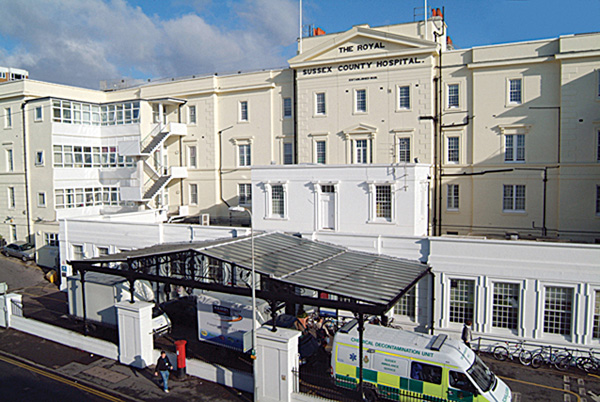News: The Vote

Watchdog offers prescription to ensure Brighton and Hove patients leave hospital more quickly and comfortably
A health watchdog has urged hospital bosses to improve the way that patients are discharged from Brighton’s busiest hospital.
Healthwatch Brighton and Hove said that it had received information suggesting that “some people were leaving the Royal Sussex County Hospital through a discharge process that was rushed and in some cases incomplete”.
As a result, Healthwatch surveyed 43 people with some recent experience, with a particular focus on carers and people with mental health issues. In a report which was published last week it said that it also interviewed key people from all of the services involved, visited the discharge lounge and drew from additional research by community groups.
It said: “Our volunteers found the discharge lounge to be small and outdated for the scale of service it provides. The new building, which is scheduled to be complete by 2019, should alleviate a lot of longer-term environmental problems. However, there were a range of issues which should be addressed more immediately.
Many people felt vulnerable and disorientated as they were leaving hospital
“Regarding care and attention during the discharge, multidisciplinary teams were praised for keeping all staff members well informed about patients’ changing situations.
“Many people felt vulnerable and disorientated as they were leaving hospital and found that new information was hard to absorb. It was noted by key staff members and patients that the hospital discharge booklet was scarcely used and that patients’ main concerns when leaving hospital were around retaining important information and how they will manage at home.
“When people experienced delays they were most commonly due to waiting for medication or patient transport. In a recent review, staff had suggested that if a patient is likely to be discharged the next day, doctors could write up their prescriptions early to allow the pharmacy to prepare the medication on time. Increased pharmacy hours were also suggested.
“A number of steps are already being introduced to improve waiting times for hospital transport. The hospital has put on a small service to relieve patient transport in times of high demand and adult social care is introducing a scheme for paid carers to collect the people they care for.
“The information we have gathered indicates that, despite often positive staff intentions, the systems that allow fast hospital discharge are impacting on the quality of patient experience and their likelihood of returning to hospital in the near future.
“There appears to be a widening gap between what the hospital’s discharge policy states and what is happening on the ground in the day-to-day life of the hospital. A more person-centred approach would adjust this to ensure people feel prepared and happy to leave hospital.”
The report contains 11 recommendations, with responses from Brighton and Sussex University Hospitals NHS Trust which runs the Royal Sussex. One of the recommendations urges the trust to “address issues around patient dignity and hot water availability in the discharge lounge”.
The trust said: “The hot water availability is currently in the hands of our Maintenance Department and (we) hope to have that resolved soon. Patient dignity is always in the forefront of our care in the lounge. We have a clothes cupboard which is stocked with items kindly donated by staff, relatives and previous patients, and wards will use the donations to ensure patients are dressed if they have no clothing with them before arriving in the lounge.
“We undertake daily audits, and have done for some years, which have shown a great improvement in the amount of patients leaving hospital dressed. Patients who are not dressed, or do not have accesses to clothing do come to the lounge, and we ensure that they are suitably dressed to ensure we protect their dignity at all times.”
Trust Chief Executive Matthew Kershaw touched on the subject in a recent message to staff. He mentioned ten high-impact schemes to help manage the pressure on the Accident and Emergency (A&E) Department. He said that one involved “strengthening our Rapid Discharge Team presence at the front doors to help reduce the number of patients admitted, and start discharge planning sooner”.




















